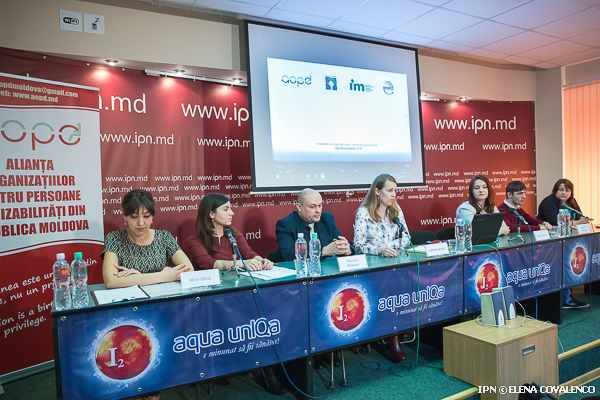The largest part of companies in Moldova that employ persons with disabilities are foreign capital companies, while the national companies are very open to dialogue and less to employment. Specialist in labor relations and recruitment of the Association “Motivatie” Ruslan Musteata, in a news conference at IPN, said a part of the employers do not accept the idea of employing persons with disabilities at least conceptually.
“When we have meetings with employers, our message centers on the recruitment of persons with disabilities depending on their skills and aptitudes, not by showing mercy in offering a job,” stated Ruslan Musteata.
Vlad Andreev, a young man with disabilities, works as an office manager and is an amateur photographer. After graduating from the Polytechnic College, he knocked at many doors. The employers assessed him by appearance, not by his skills. “The National Employment Agency told me that I need to have higher education. Now I’m close to finishing the university. It’s not enough to ask for a job. We must make effort and show that we have skills for the job to which we aspire,” he stated.
Head of the Human Resources Division of “Artizana” company Elena Shoimaru said the company she represents has employed persons with disabilities during over 30 years. “The number of persons with disabilities working at our company increases annually. We do not have barriers and do not discriminate. We employ persons according to their skills and enjoy rather efficient cooperation. About 35 of our 400 employees are persons with special needs,” she stated.
In the same connection, Ludmila Iachim, project manager at “Motivatie”, noted the excessive protection of the young people with disabilities by their families is a problem on employment, but employers are very open to such persons. “Employment depends a lot on the young people who show initiative and on their families who invest in education and development. The cases are different. Sometimes the young people are not sufficiently prepared to satisfy the labor market demand because they do not have the necessary training,” she said.
The news conference was held within the Partnerships for the Inclusion of Persons with Disabilities Project that is implemented by the Alliance of Organizations for Persons with Disabilities within the program “Common Initiative to Promote Equal Opportunities” that is carried out by East Europe Foundation and the Partnership for Development Center with the resources provided by the Swiss Agency for Development and Cooperation, the Government of Sweden and the Ministry of Foreign Affairs of Denmark/DANIDA..

